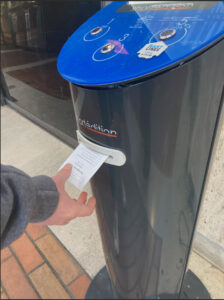As sea levels rise, extreme weather worsens, and the climate crisis becomes increasingly threatening, a wave of religious environmentalists have joined the fight for climate justice.
One such environmentalist is Bishop William Swing, who is currently retired in San Mateo. Swing was the Bishop of the Episcopal Diocese of California for 27 years and founded the United Religions Initiative (URI), a non-profit interfaith network that facilitates projects all across the world.
He has dedicated much of his career to causes such as nuclear disarmament, San Francisco homelessness, AIDs and, of course, environmentalism. Bishop Swing explained that in recent decades, interest in environmental matters within communities of faith has skyrocketed.
He also noted that the surge in Christian care for nature is not a completely new phenomenon, but rather a rebirth of rural Christian tradition. “In every church we had prayers for planting the seeds, and then in the fall, you’d have a harvest. The church was in a rhythm of nature. But once the industrial revolution really took over, that just got completely lost. I think the church turned its back on nature,” he said. Many are familiar with the clear environmental ramifications of the industrial revolution, however, Bishop Swing points out a less obvious environmental consequence. As the United States rapidly urbanized, the once clear connection to the land faded away in many communities, including communities of faith.
However, Christian interest in environmentalism has bounced back. “35 years ago, no priests that I knew wanted to work on the environment. That’s not the case anymore,” Bishop Swing said.
Bishop Swing believes that loving nature is an intuitive way to live by Christian values. “When I think of my own religious awakening, it has much more to do with rivers and mountains and sky and beauty and nature. I think that’s the touchstone more than Theology at the beginning,” he said.
Furthermore, Bishop Swing’s religious practices are deeply intertwined with nature. “The Bible says if you want to know God, you’re probably going to meet God outdoors. For me, I think discovering the presence of God in nature comes first and then responsibility for that nature comes second,” he said.
This religious belief in human responsibility for the environment is what inspired Bishop Swing’s colleague, Reverend Canon Sally Grover Bingham, to start Interfaith Power and Light (IPL). IPL is an Oakland-based non-profit. According to their website, IPL’s mission has been to “inspire and mobilize people of faith and conscience to take bold and just action on climate change.” Bingham has been a part of the environmental movement for decades, and was among the first Episcopal leaders to recognize climate change as a Christian responsibility.
Since then, IPL has worked with thousands of faith groups to help bring clean energy to their congregations. “All of these churches, temples, mosques, and other worship spaces are often huge buildings and they’re great community spaces. Interfaith Power and Light partners with them to create community hubs that are green and energy efficient and can make it through even when the worst climate disaster strikes,” said IPL employee Gregory Stevens.
Stevens has noticed a similar trend to Bishop Swing. “For Christians, there was this weird thing that developed over time where they became kind of separate from the world or even above nature, and I think that over time, that has has changed and they’ve realized that this is our living system, we’re a part of it, and we need to be in a good healthy relationship with it,” they said.
Episcopal environmentalism is here to stay. In California, a strong climate-conscious wave of faith persists through the work of Bishop Marc Handley Andrus, who has made climate change his top priority since becoming the Bishop of the Episcopal Diocese of California in 2006.
He annually attends the UN Climate Conferences and has been spotted at climate marches across the Bay Area. Bishop Andrus co-oversees San Francisco’s own Grace Cathedral, and has spearheaded countless climate efforts in the San Francisco Bay Area and beyond. He led the effort to declare climate change an intersectional emergency within the House of Bishops in July of 2022, and his environmentalist philosophy has rippled throughout Episcopal communities.
During the COVID-19 pandemic, packed religious centers were disrupted and congregations had to find creative ways to practice faith while adhering to local health guidelines. Bishop Andrus took this as a unique opportunity to take Episcopal faith outside. He led events such as climate-themed outdoor confirmation ceremonies, allowing young Episcopalians to consider their responsibility to the planet as they stepped into the next phase of their relationship with their faith.
The work of Bishop Swing, Bishop Andrus, Reverend Bingham and the Bay Area’s countless other Episcopal environmentalists shows a clear resurgence of environmental concern within the Episcopal faith.







